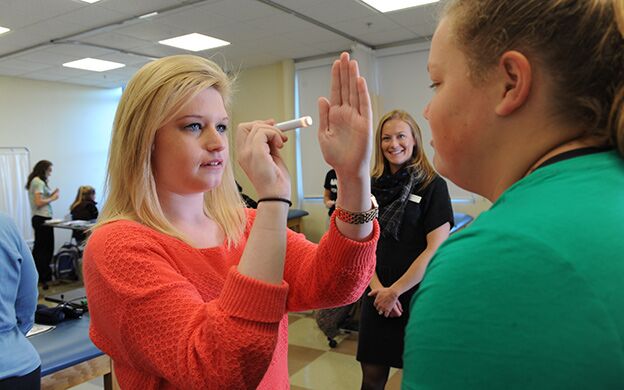Processing Your Payment
Please do not leave this page until complete. This can take a few moments.
- News
-
Editions
View Digital Editions
Biweekly Issues
- December 15, 2025
- December 1, 2025
- Nov. 17, 2025
- November 03, 2025
- October 20, 2025
- October 6, 2025
- + More
Special Editions
- Lists
- Viewpoints
-
Our Events
Event Info
Award Honorees
- Calendar
- Biz Marketplace
Maine faces a looming shortage of nurses
 Courtesy / Saint Joseph's College
Saint Joseph's College in Standish has received a $1.5 million challenge grant from the Harold Alfond Foundation to address critical shortages in Maine's nursing workforce. The initiative is timely, given the latest Maine Nursing Forecaster showing the state will be down more than 3,000 nurses by 2025 if steps are taken to increase capacity for in-state training.
Courtesy / Saint Joseph's College
Saint Joseph's College in Standish has received a $1.5 million challenge grant from the Harold Alfond Foundation to address critical shortages in Maine's nursing workforce. The initiative is timely, given the latest Maine Nursing Forecaster showing the state will be down more than 3,000 nurses by 2025 if steps are taken to increase capacity for in-state training.
The latest Maine Nursing Forecaster predicts that the state will be down more than 3,000 nurses by 2025.
Maine Public reported that the forecast says the solution is to increase capacity for in-state nursing education and recruit out-of-state nurses.
St. Joseph’s College in Standish is already moving to address critical shortages in Maine’s nursing workforce, thanks to a $1.5 million Harold Alfond Foundation challenge grant that was announced in January.
The Alfond grant will be applied toward the creation of a new Center for Nursing Excellence at Saint Joseph's.
A substantial portion of Maine's nursing workforce, 43%, is at or approaching retirement age. The crisis is more pronounced among nursing educators, with 74% reaching retirement age, according to information from St. Joseph at the time of the announcement.
UNE's nursing enrollment triples
Early in 2016, the University of New England said it was also tackling health care education from a different angle, with the establishment of an online graduate degree program in health information technology. But Dr. Jennifer Morton, director of UNE's Department of Nursing, said nursing also is one of the many health professions programs offered at the university that are growing and evolving to meet the needs of the market.
“Enrollment in UNE’s nursing programs has tripled in the last five years,” she said in a written statement provided to Mainebiz. “Despite the rapid growth, the program remains strong: our National Council of State Boards of Nursing pass rates are well above the national average and the highest in Maine in 2016 for all programs demonstrating high quality education along with growth.”
Morton said actions being taken by UNE to address the state’s nursing shortage include the scheduled relaunching in fall 2017 of the university’s bachelor of science nursing completion program at a 50% discount to be competitive for the working nurse.
She also noted that UNE’s Department of Nursing in the last four years has received two prestigious Nurse, Education, Practice, Quality and Retention grants totaling $1.9 million to build new models of clinical education in the community.
“This releases some of the burden of hospitals and the shortage of clinical sites,” she said.
Legislation seeks to enhance licensing compact
Bangor Daily News reported that Maine now graduates about 970 nurses per year, adding that state officials announced plans Tuesday to increase nurse-training opportunities within Maine, including a Maine Summit that will be hosted by the LePage administration and the University of Maine system in the coming months.
The newspaper also reported that state Sen. Amy Volk, R-Scarborough, co-chairwoman of the Legislature’s Labor, Commerce, Research and Economic Development Committee, is sponsoring a bill to enhance the National Nurse Licensing Compact, which allows nursing licenses to cross state lines.
Editor's note: This story has been updated to include information about steps being taken by the University of New England to address the state's shortage of nurses.
Mainebiz web partners

The Giving Guide
The Giving Guide helps nonprofits have the opportunity to showcase and differentiate their organizations so that businesses better understand how they can contribute to a nonprofit’s mission and work.
Learn More
Work for ME
Work for ME is a workforce development tool to help Maine’s employers target Maine’s emerging workforce. Work for ME highlights each industry, its impact on Maine’s economy, the jobs available to entry-level workers, the training and education needed to get a career started.
Learn More
Groundbreaking Maine
Whether you’re a developer, financer, architect, or industry enthusiast, Groundbreaking Maine is crafted to be your go-to source for valuable insights in Maine’s real estate and construction community.
Learn more-
The Giving Guide
The Giving Guide helps nonprofits have the opportunity to showcase and differentiate their organizations so that businesses better understand how they can contribute to a nonprofit’s mission and work.
-
Work for ME
Work for ME is a workforce development tool to help Maine’s employers target Maine’s emerging workforce. Work for ME highlights each industry, its impact on Maine’s economy, the jobs available to entry-level workers, the training and education needed to get a career started.
-
Groundbreaking Maine
Whether you’re a developer, financer, architect, or industry enthusiast, Groundbreaking Maine is crafted to be your go-to source for valuable insights in Maine’s real estate and construction community.
ABOUT
NEW ENGLAND BUSINESS MEDIA SITES
No articles left
Get access now
In order to use this feature, we need some information from you. You can also login or register for a free account.
By clicking submit you are agreeing to our cookie usage and Privacy Policy
Already have an account? Login
Already have an account? Login
Want to create an account? Register
Get access now
In order to use this feature, we need some information from you. You can also login or register for a free account.
By clicking submit you are agreeing to our cookie usage and Privacy Policy
Already have an account? Login
Already have an account? Login
Want to create an account? Register







Comments